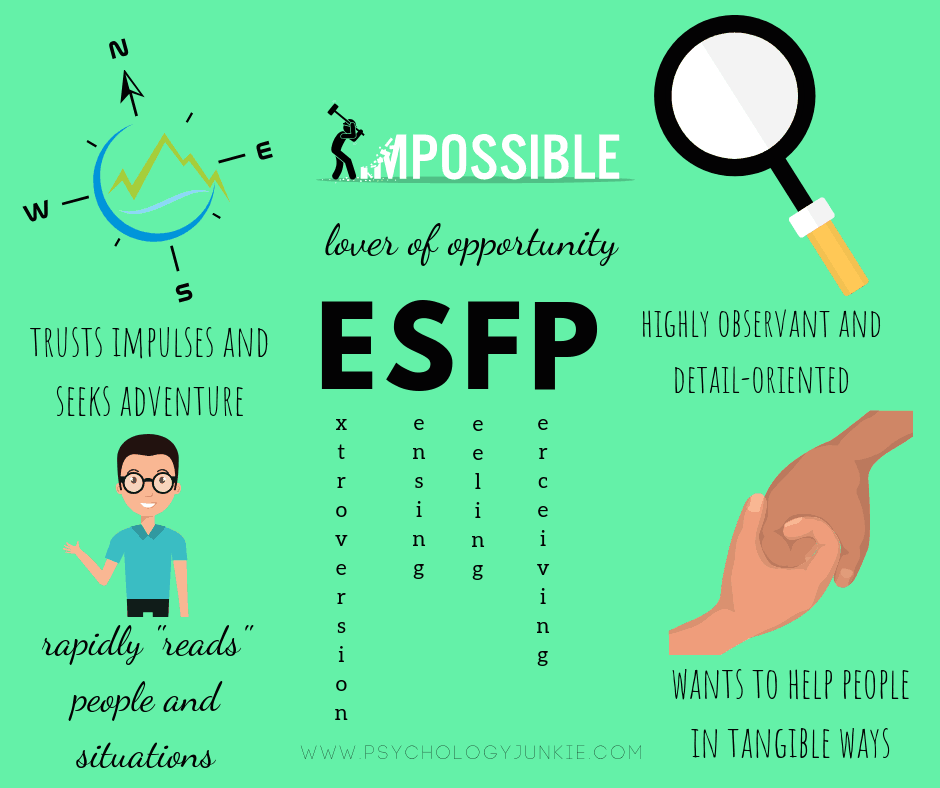What it Means to be an ESFP Personality Type
The Meaning of the ESFP
The Energetic, Opportunistic Type
Generous, practical, observant, and compassionate

The ESFP Personality Type in Brief
ESFPs approach life with a desire to experience it to its fullest degree. These types are always tuned into their environment, looking for opportunities to make an improvement. A strong sense of adventure is close to their heart and they yearn to trust their impulses and act on their immediate instincts. Because ESFPs are so keenly observant, they tend to be realists, quickly able to see what’s relevant, what’s factual, and what actually happened. They rarely have their head “in the clouds” because it’s so important for them to be ready for anything. These types crave a lot of variety – in fact, they are often “jacks-of-all-trades” because they are drawn to so many different experiences and tasks. They are adept at multi-tasking, keeping their eyes and ears in tune with several things at once.
ESFPs have many talents – they are often the entertainers, entrepreneurs, surgeons, and coaches of the world. They want to roll up their sleeves and make a difference in a tangible way – whether that’s through making a crowd laugh, responding swiftly on a football field, performing open-heart surgery, or starting their own business. These types want to test their limits and push themselves, especially if what they’re doing is in the service of others. According to the MBTI® Manual, ESFPs who took the Life Styles Inventory assessment ranked higher than other types on being Changeable, Energetic, Forceful, Initiating, and Resourceful. These qualities truly exemplify their type! ESFPs enjoy change and variety, they meet life with resilience and gusto, and they are constantly scanning their environment to see what resources can be used to optimize the current moment.
Driving Force: To make the most of each moment. To maximize resources and create opportunities. Stay in synch with people and situations in their environment and thrive on trusting their impulses.
Backup Strength: Trust their personal belief and value system, staying focused on what they want for themselves. Skilled at establishing personal bonds with other people.
Weaknesses: Can act too quickly and forget to consider the future implications of their actions. May be logically inconsistent at times.
Stressors: Being overly controlled, confrontation, too much time alone, excessive paper-work or theory, being asked to complete a task without specific instructions, excessive long-term planning.
Not sure what your personality type is? Take our new personality questionnaire!
The Meaning of the ESFP’s Four-Letter Code (in Brief)
E = Extroversion. ESFPs focus on the outer world of experiences, people, and events, before focusing inwards.
S = Sensing. ESFPs focus more on the concrete, existing world than the world of theories and abstractions.
F = Feeling. ESFPs focus first on their value system and personal ethics when they have to make a decision.
P = Perceiving. ESFPs have a flexible, spontaneous approach to life. They enjoy generating options and tend to mix work with play.
Famous Rumored ESFPs: Bill Clinton, Michelangelo, Richard Branson, Larry Ellison, Howard Schultz, Wayne Dyer, Desmond Tutu, Steven Spielberg, Beyonce, Will Smith, Jamie Oliver, Katy Perry, Nicki Minaj, Justin Bieber, Cameron Diaz, Andy Samberg, Dave Chapelle
ESFP Overview
One of the defining characteristics of the ESFP personality type is their ability to react quickly and competently to sudden changes in their environment. They are the types that notice everything. They are always scanning their environment, picking out any details that stand out, don’t fit, or could present an opportunity or a risk. Along with ESTPs, ESFPs are probably the types who are the fastest when responding to the phone ringing, a ball being thrown their way, or any sort of incoming stimuli. Because ESFPs are so immersed in their environment, they crave being active, connected, and competent to handle any physical challenge that comes their way. They enjoy taking smart risks, whether that means traveling to a less-frequented part of the world or quitting their stable 9-5 job to launch their own business. They crave autonomy, free expression, and a life that aligns with their deeply-held value system. As visionaries and pragmatists, they want to roll up their sleeves and get into the real work of making the world a better place or (if nothing else) making it more fun and entertaining!
ESFPs are also people of empathy and conscience. They are very aware of the emotional bonds that exist between them and others and they try to use those bonds to connect, motivate, and understand. They often make skilled counselors, teachers, coaches, or health care workers because of their concern and desire to make a difference. They tend to spend their lives forming their own personal moral code that they try to follow regardless of whether or not their outer situation changes. ESFPs seek to understand what their unconditional values are, what convictions or “truths” are worth living and dying for. ESFPs tend to explore and develop these values as they go through life, refining them more and more as each year passes by.
Although ESFPs are extroverts they may get restless making small talk for long periods of time. They like being active, moving around, getting projects started, exploring new environments. Energetic and typically friendly, ESFPs are stimulated by interaction with other people, but it won’t be long before they’re coming up with exciting adventures to pursue or opportunities that they don’t want to miss. And although ESFPs are feeling types, they are extremely matter-of-fact and no-nonsense. They are people of realism and facts – they are moved by their emotions and try to discover the underlying reasons for them, but they also value evidence, real-world experience, and facts. An understanding of the observable facts is essential to them when they make decisions and judgments.
One caveat I do want to bring up is that your personality type can show up differently depending on your enneagram type. For example, an ESFP 4 in the enneagram would be more individualistic, more prone to melancholy, more dreamy and creative. An ESFP 7 might be more excitable, action-oriented, and less fond of introspection and self-analysis. If you’d like to find out more about the enneagram you can do so here.
At Their Best:
At their best, ESFPs live with a strong sense of compassion and initiative. They stand up for their values, for the underdogs, and for personal freedoms. They are often expedient, resourceful, enthusiastic, and encouraging. Their zest and joy for living is contagious and they often draw people to them because they help them to see the world in a more optimistic light. Highly aware of personal dynamics, at this level ESFPs are very effective at motivating and inspiring people to achieve their dreams and goals. They are also highly tolerant of people with different perspectives, seeing the strengths of people with opposite preferences (like N/T/J).
At their most mature ESFPs don’t feel like they have to be the “life of the party” all the time. Although they can be very dynamic and compelling leaders, they also enjoy relaxing and quietly observing and reflecting. They are drawn to a variety of people and through their interactions, they become well-versed in understanding numerous perspectives, cultures, and lifestyles. When it comes to decision-making, healthy ESFPs pause before moving forward to consider long-term perspectives. They may ask for help from people with opposite preferences in areas that they know are weaker for them. For example, when it comes to strategically planning a business move they may enlist an INTJ to help them with their plan.
Average ESFPs:
At an average level, ESFPs have a “can-do” energetic attitude and a friendly, appreciative demeanor. They are often seen as fun-loving and counted on for their practicality and strong sense of team spirit. At this level, they will have a good idea what kind of person they are and will spend their quiet time analyzing whether or not they’ve lived in a way that is aligned with their values and desires for life.
At an average level of maturity, ESFPs may occasionally push their type preferences too forcefully on others. They can become domineering, excitement-seeking, overly-impulsive, and hypersensitive at times. They may start projects with enthusiasm and energy, only to leave them half-finished as the excitement wanes. They can also struggle to keep track of detailed processes or ignore limitations that might prevent them from acting or making things happen. It can be tempting for them to manipulate rules or situations to justify their actions or intentions.
It’s important to note that average ESFPs are not always demonstrating the negative qualities listed here. These signs may only show up occasionally.
Unhealthy ESFPs:
At an unhealthy level, ESFPs become reckless and pleasure-seeking to an unhealthy degree. They are often very persistent in trying to make their environment exciting and immersive, but this can mean that they talk over others, become pushy or overly-dramatic to create a buzz of excitement. In the heat of the moment, they may say or do things they later regret (like teasing people too carelessly or taking a dangerous risk). They can also become overly-reactive when they feel that their freedom is threatened – throwing tantrums, becoming overly indulgent, and dismissive. At this stage, they tend to feel that they are very in-tune with other people, but in actuality, their perceptions are distorted by their own preferences. In the heat of the moment and in pursuit of their own desires they may take no notice of the people around them and their needs or comfort levels.
Some ISFPs spend the majority of their lives at an average or healthy state, while others fluctuate between the three states depending on their stress-levels and maturity. Every individual’s experience will be different.
Personal Growth Recommendations for ESFPs:
- To maximize your sensing “superpower,” take moments throughout the day to scan your environment. Are there any resources that you could use to solve a problem? Are there any opportunities you haven’t noticed until now?
- Learn something that utilizes your observant, hands-on nature. Learn how to fly a plane, rock climb, juggle or do magic tricks. Embrace your sense of adventure!
- Take time each day to tune in to your values, needs, and emotions. Have you lived in a way that aligned with your values? Did you act with integrity? Take some time to write down five things that are deeply important to you – things you would devote a great deal of time and energy towards, or even die for. How can you embrace those values in your everyday life?
- Enhance your analytical abilities by willingly getting into a debate with someone you trust (pick a subject that won’t offend either of you). How can you argue your position using logic, facts, and provable evidence? Practice taking their arguments or critiques without taking it personally. What can you learn from this experience?
- Before you make a decision or take an action, pause and decide whether this action aligns with your long-term goals and values. Will you regret this in a year? 5 years? 10 years? Will you be glad you did this in that amount of time?
What Are Your Thoughts?
Is this article relatable to you as an ESFP? Do you have any insights or thoughts to share? Let us know in the comments!
Find out more about your personality type in our eBooks, Discovering You: Unlocking the Power of Personality Type, The INFJ – Understanding the Mystic, and The INFP – Understanding the Dreamer. You can also connect with me via Facebook, Instagram, or Twitter!
Find Out More About Your Type:
7 Ways That ESFPs Make an Impact
Here’s What Makes ENFPS and ESFPs So Amazing (and How to Tell Them Apart!)
10 Things ESFPs Look for in a Relationship
10 Things You’ll Relate to if You’re an ESFP
10 Things You Should Never Say to an ESFP















Hi, Susan, will you be posting an in-depth personality profile for the ESFP? I’ve lately been very confused about whether I am an ESFP or an ISFP (I think because they contain the same functions, though in reverse order?). So I’ve been hoping to read an in-depth personality profile of the ESFP to provide a proper point of comparison with your ISFP posts. Thank you so much for what you do! I’ve come to be more discriminating about MBTI posts on the Internet, thanks to your website!
I’m hoping to! I have so many articles on my “To-write” list that it can take me a while, but that is definitely one 🙂
Hi Susan, I hope you will see this 🙂 I’m an esfp with an intj brother, an infj mom and Isxjs friends. I’ve struggled with depression and anxiety since I was little, my intj brother has helped me in many ways in my life, and he has made me a pretty mature esfp. My problem is that I don’t know how to get friends, I don’t like to show my feelings, I over analyze things too much and spend too much time alone. What worries me the most is that I over analyze things, every time I have to make a decision in which my feelings are in the middle, I think of all the ways I can act and I decide one and I don’t know if it was the correct which makes me very unpredictable and stressed. Also I need more xSxP friends, but I feel like they are out of my comfort zone, I already know how to behave with Js and that keeps me calm. Do you think I should improve a particular cognitive function or an aspect in my life? Would you be interested in us talking? I am very open to the interactions of ideas!
On every other site my wife has tested on she seems to be an infp, just inside the introverted center line. What is the difference in this test that she would come up as an esfp?
I have done several tests and come up as an intp as I do on this site.
The site is very interesting and fun.
Thank you
.
Hi Paul! When I created the questionnaire on my site I focused on the underlying cognitive functions of types rather than the dichotomies (E/I,S/N, T/F, J/P). The reason I did this is that so many people get mistyped on other tests online. There tends to be an intuitive and introvert bias on most tests and as an MBTI® practitioner I just wanted to get one as accurate as possible 🙂
The Myers Brigg testing on their site said I was ENFJ yours said ESFP. Omg I have spent an hour trying to write this losing the page once then I have redone it a hundred times so if it’s not like I’m still right but I’m just going to hit send lol. I had my different characteristics list. Like for instance I’ve always love a good debate and ask to be critiqued. Also I often find myself bouncing thoughts off someone close not that I actually have more then maybe 2 or 3 close people. Making friends isn’t easy for me girls don’t like me which is something I’ve always been able to sense upon meeting someone. But that’s the only thing that hasn’t changed because my personality was different when I was in my teens I don’t know if that matters when it comes pretty nice personality now I’m just wondering why do you think that it come up different? Oh and I have such a problem with public speaking it calls me to not get my criminal justice degree. I took an F over reading a paper out loud which was b/s since the teacher seen me in the bathroom throwing up from trying. I also spend most my time alone not being able to work for 1 the 2nd reason is I chose to. I can be an introvert or an extrovert. Oh I bout forgot my main reason for stumbling onto your site I’m just wondering if you know why when I research the rarest Myers-Briggs rarest personality type I get two different answers. Mostly everything I’ve read has always said infj was the rarest for both men & woman I just happen to come across your article saying it’s not for woman. Thank you!
Hi Susan, I’ve been introduced recently to u’r very interesting site. A few years back I did the Myers Briggs personality test which came out as INFJ.
Repeating the personality test on this site I’ve turned out to be a ESFP !!! ???? Now I’m really confused as I can draw parallels with both types! What should I take from this? Thnx a lot in advance for u’r reply ????
Hi Susan, I’ve been introduced recently to u’r very interesting site. A few years back I did the Myers Briggs personality test which came out as INFJ.
Repeating the personality test on this site I’ve turned out to be a ESFP !!! ???? Now I’m really confused as I can draw parallels with both types! What should I take from this? Thnx a lot in advance for u’r reply ????
I find that this analysis is in amazing alignment with me (or at least how I perceive myself). Thank you for this great write up. It is very helpful .
This was so helpful. Now I can know how to develop yourself. Thanks a lot.